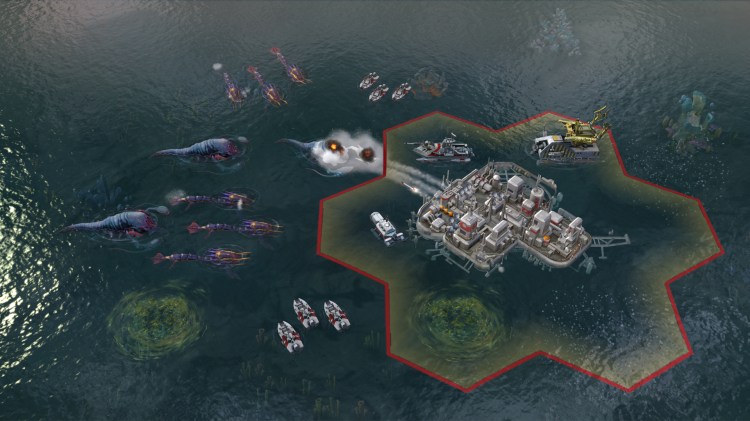“Obviously they have to play by many of the same rules for the game to operate. But their unique abilities and the particular advantages that they have let them bend rules that other civs have to abide by,” McDonough said of the new Civilization: Beyond Earth – Rising Tide factions. “You might take for granted how cities grow, or how production is made, or what culture of science means and what they’re used for if you’re a conventional civ. Al Falah and the four new civs maybe don’t have those same rules.”
New ways to piss other leaders off
Andrew Frederiksen said the new diplomacy system will take gameplay beyond the old choices of “Do I declare war, make peace, or trade goods” approach of the core Civ: BE or earlier games in the series.
“If a leader has the trait that I care a lot about economy, they’re going to respond to strong economies one way, weak economies another way,” he said. “That’s going to provide what deals you can make with them, how you can interact them diplomatically. Those can change and evolve as the game goes.
“If you have a leader who’s very passive and focused on trade, and then they get backed into a corner by a bunch of other civs, building really big warlike nations, they’re going to react. They’re not just going to stay there and be the same civ and get stomped under a boot.”
You can develop your own diplomacy personality as well, McDonough said. The idea was to make the A.I. diplomacy almost as interesting as playing another human being.
“Diplomacy was a whole lot more nuanced between human players than between human players and A.I.,” he said “We really want that nuance, that richness, that actual real interpersonal relationship that human players bring to the game. We want to put that into a system where it’ll work even if it’s an A.I. on the other side.”
Choosing an affinity doesn’t mean giving up the others any more
That addition of details plays out in the hybrid affinities in the expansion as well. You build up the three original affinities via your approach in the game, giving you bonuses, abilities, special units, and upgrades. (They consist of Supremacy, focused on robotics; Purity, focused on human development; and Harmony, focused on genetics and adopting the benefits of alien life.)
In Rising Tide, you’ll be able to reap benefits by striking off on some tangents from your main affinities into hybrid trees.
“Players really liked affinities,” McDonough said. “But the one thing that they didn’t do was really offer you the opportunity to multiclass.”
The new hybrid affinities don’t just add more types, he said. You’ll still need to pursue one affinity or another to the end if you want that type of victory. These just reward you for combining them at points along the way.
“They’re more ways to augment, or twist, or otherwise personalize your game along a dominant affinity,” he said. “So they’re expressed as player unique abilities, they’re expressed in the balance of victory points and the victory conditions themselves but most especially expressed as unique military units and unit upgrades for the standard units. ”
They also look pretty “wild and strange,” he said. They tried to find hybrid units that weren’t just blends of the parent affinities, but things that truly added a different flavor. So biometallurgy, for example, and other things that you used to only find in the spider-like web of tech progress the game would allow you to progress down.
“As a result, not only do they look crazy, but they have wild abilities,” McDonough said. “They’re strange new units that let you do things that you couldn’t do in Civ in the past. It can really twist the way you think about how an army should play.”
Frederiksen said they expect the changes to diplomacy and hybrid affinities to help players tell a more complex story about their civilizations and what’s important to them.
You can also affect your civilization with the new artifact system, which rewards you for scouring the landscape, finding nifty items, and combining them in the right ways.
“They can almost end up being like wonders, where you’re the only one on the planet who found this particular group, so you get benefits nobody else can get,” McDonough said. “It’s dependent on what you manage to find, so every game is different.”
That’s the aim of the whole expansion, the developers said.
VentureBeat's mission is to be a digital town square for technical decision-makers to gain knowledge about transformative enterprise technology and transact. Learn More



